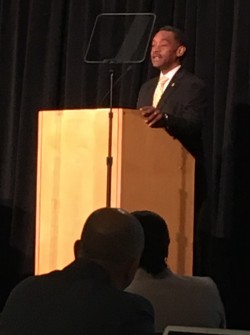Researchers Participate in National TBI/PTSD Summit
Sometimes called the “invisible wounds” of war, illnesses such as Traumatic Brain Injury (TBI) and Post Traumatic Stress Disorder (PTSD) are critical health issues facing our nation’s Veterans. Operation Enduring Freedom (OEF; Afghanistan) and Operation Iraqi Freedom (OIF; Iraq) have resulted in a higher percentage of armed forces deployments than ever before in history. While advances in medicine and technology have reduced casualties, brain health issues are a growing concern, with as many as 20 percent of Veterans from these wars being diagnosed with PTSD.
Recently, businessman and Veterans health advocate Steven A. Cohen convened a national conference of public and private scientists, researchers, clinicians, and policymakers in Washington, D.C., to explore opportunities to accelerate research and treatment of TBI and PTSD. The Cohen Veterans Care Summit, hosted by Cohen Veterans Biosciences and Cohen Veterans Network, brought together leaders of industry, academia, and government working in these areas .
Several BU faculty participated in the Summit, including Associate Professor of Neurology Anna Hohler, MD; Professor of Psychiatry Terence Keane, PhD; Professor of Psychiatry Brian Marx, PhD; Associate Professor of Psychiatry Mark Miller, PhD and Associate Professor of Psychiatry Ann Rasmusson, MD.

Jonathan Woodson, MD, Faculty Director of the Boston University Institute for Health System Innovation, gave opening remarks. Woodson, who returned to BU this fall after serving six years as Under Secretary of Defense for Health Affairs in the U.S. Department of Defense, focused his remarks on the importance of effective policy formation to improving health care delivery systems.
“The most pressing issue we face today is how we create policies that advance medical research and drive care and treatment strategies to a new level,” Woodson said.
Woodson told the audience that current policies related to academic research discourage collaboration, which is necessary to accelerate health care improvements. Instead, Woodson advocated for increased partnership with organizations that do policy work and an enhanced focus on the intersection of science and human systems.
“We need to create policies that will enable us to achieve sustainable solutions to our health care challenges,” Woodson said. “Our goal is to lighten the load – both the equipment and the psychological burden – that our service members carry as a result of service.”
Submitted by Monica Parker-James.